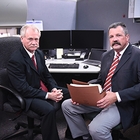Posted by: Media Relations

While homicide cases can go cold for a variety of reasons, Sheriff Mike Boudreaux said he will not allow these cold cases to sit idle on a shelf at the Tulare County Sheriff’s Office.
He’s committed to the victims of homicide and their families who seek justice and closure.
Cold Case Homicide Units are common throughout law enforcement however the Sheriff's Office has had vacant positions within its unit. Sheriff Boudreaux recently re-established this unit with experienced and qualified people.
The Sheriff's Office is pleased to announce and introduce the two people selected to serve the citizens of Tulare County within the Cold Case Homicide Unit. They are detectives Christopher Dempsie and Dwayne Johnson and, together, they have a combined law enforcement experience of 70 years.
Johnson said cold cases are difficult to solve.
"Memories fade as time lapses and witnesses move on,” he said. “Evidence can deteriorate over time.”
Before DNA analysis was available, detectives didn’t consider certain types of evidence. Johnson and Dempsie will sift through old evidence to see what they can discover with modern techniques.
“[Evidence] wasn’t packaged to preserve DNA,” Dempsie said. “They weren’t trying to preserve something they didn’t know existed.”
Yet DNA can be extracted from some of the evidence, Johnson said.
“They extract DNA from dinosaurs,” he said. “Sometimes evidence is there, sometimes it’s not.”
Also, as time lapses, witnesses may be ready to step forward to offer new information.
For some people, their conscience propels them to talk. For others who are already in the criminal justice system, they may try to better their position on another case. When witnesses come forward with that little piece of information, all of a sudden it can open the door to solving the case.
“When someone comes forward after multiple years – that’s what we’re always waiting for,” Johnson said.
Dempsie remembers a cold case he helped solve while working for the Porterville Police Department.
“I took the case out of the blue and ran with it,” he said. “At the time the crime occurred, everyone was afraid of the suspect but 20 years later people were not afraid to talk.”
Cold case detectives use new techniques that weren’t available even 10 years ago. For DNA analysis, what’s new is the sample tested can be quite small. The process, however, is very costly and time consuming.
“Today, you don’t need a large sample,” Dempsie said.
Another new technique is to narrow the search for a DNA match by using familial DNA analysis to look for common DNA markers specific to one family. Then investigators can look into other family members who may not be in the system yet.
“It can narrow the search from millions and billions to a family tree,” Johnson said. “Not that person but someone within that family [whose criminal record and connection to the crime scene location match up].”
In May, this new technique was needed to convict a serial killer in Los Angeles known as the Grim Sleeper after he left DNA evidence behind in a restaurant.
“Cold cases are not easy to solve,” Dempsie said. “That’s the reason they went cold.”
Law enforcement agencies owe it to the victim’s families to continue to investigate.
“Nothing short of prosecution is enough,” he said.
That is especially true for one case Johnson and Dempsie are investigating: The 1994 abduction and murder of a 10-year-old girl from the Visalia swap meet.
If you or someone you know has information about a cold case, please contact the Sheriff’s Office at 735-1898 and ask for the Cold Case Unit. If you don’t want to call, you can write a letter and mail it to the Tulare County Sheriff’s Cold Case Unit, 5959S. Mooney Blvd., Visalia, CA 93277.
Experience:
Both Dwayne Johnson and Chris Dempsie worked for the Tulare County Sheriff’s Office in the mid-1980s. They went on to other agencies. In 1990, Dempsie began working for the Laguna Beach Police Department and, later, for the Porterville Police Department where he retired as a captain in 2015.
Johnson began his law enforcement career in 1971 with the United States Army as a Military Police and Correctional Officer. Later, he worked for the St. Cloud (Minn.) Police Department, and next he worked as a Special Agent with the Federal Bureau of Investigation.
After Johnson graduated from the FBI Academy, he was assigned to Fresno. In 1982, he transferred to the Manhattan Division of the FBI. In 1984, he resigned from the FBI and returned to California. That’s when he took a job as a deputy for the Tulare County Sheriff’s Office in 1985. He worked at the Main Jail and Road Camp.
In 1986, he accepted a position with the Fresno Police Department and worked in the patrol division, investigations, internal affairs, narcotics, youth and community services and the training division before he retired as a lieutenant in 2006.
He then began working for the Tulare County District Attorney’s Office as a real estate fraud investigator. He retired from the DA’s Office and returned to the Sheriff’s Office as a Cold Case Detective.